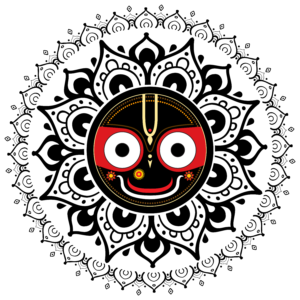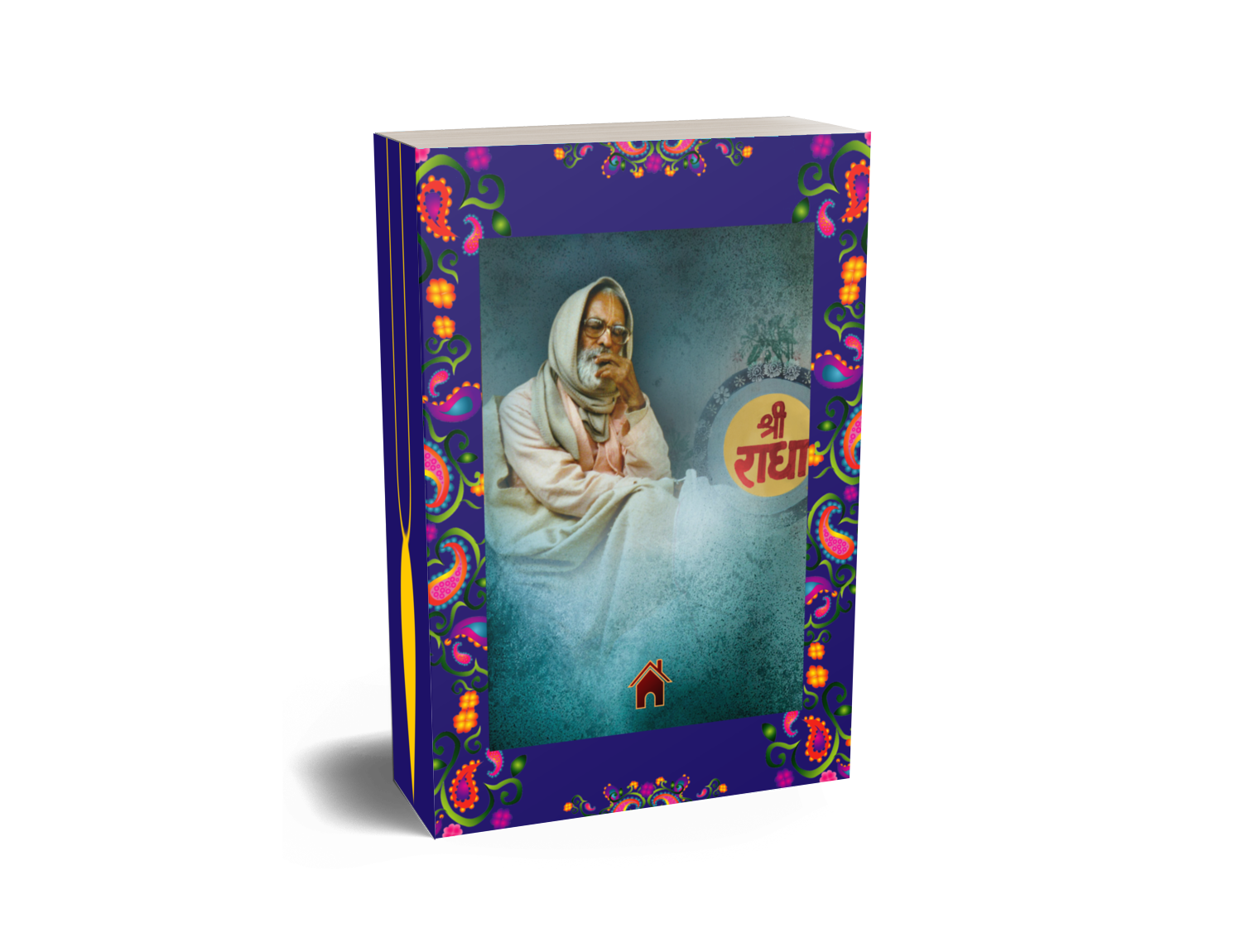

The following is an excerpt from Śrīla Bhaktivedānta Nārāyaṇa Mahārāja’s book Śrī Navadvīpa-dhāma and Other Prominent Holy Places of the Gauḍīya Vaiṣṇavas in Śrī Gauḍa-maṇḍala
Jahnudvīpa extends throughout the present Jānnagara, and is non-different from Bhadravana in Vraja. 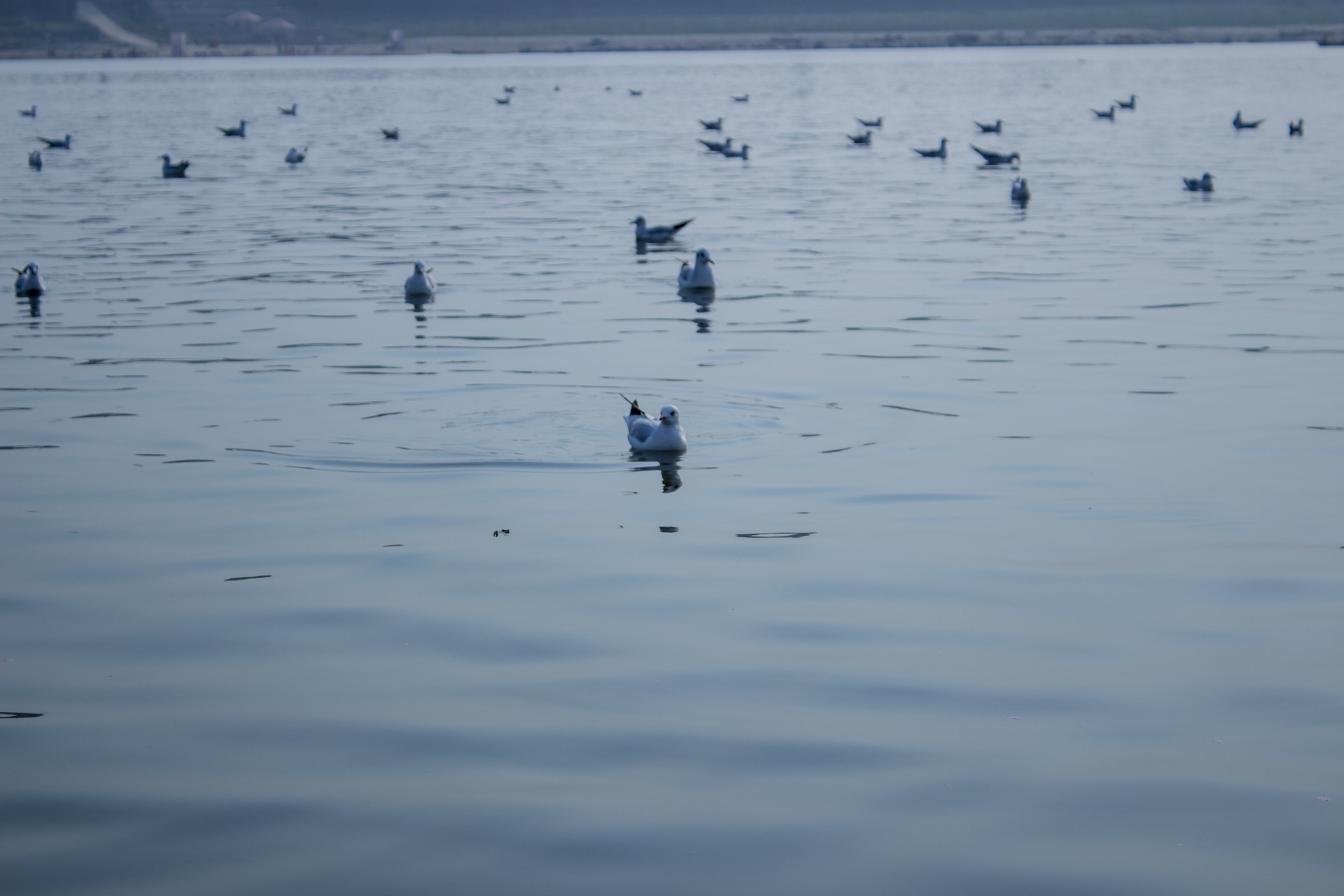 Previously, the river Jāhnavī (Gaṅgā) flowed nearby. Śrīman Mahāprabhu used to pass through here while performing saṅkīrtana with His associates, so it is a place of Mahāprabhu’s kīrtana and other pastimes. Jānnagara, the local name of Jahnudvīpa, is Jahnu Muni’s place of worship. He so pleased Śrī Gaurahari with his worship that the Lord appeared before him, golden and effulgent. Jahnu Muni became immersed in infinite spiritual joy and requested Mahāprabhu to be able to reside in Navadvīpa birth after birth. Śrīman Mahāprabhu blessed him, saying, “When in the future My pastimes manifest, you will be able to witness them.”
Previously, the river Jāhnavī (Gaṅgā) flowed nearby. Śrīman Mahāprabhu used to pass through here while performing saṅkīrtana with His associates, so it is a place of Mahāprabhu’s kīrtana and other pastimes. Jānnagara, the local name of Jahnudvīpa, is Jahnu Muni’s place of worship. He so pleased Śrī Gaurahari with his worship that the Lord appeared before him, golden and effulgent. Jahnu Muni became immersed in infinite spiritual joy and requested Mahāprabhu to be able to reside in Navadvīpa birth after birth. Śrīman Mahāprabhu blessed him, saying, “When in the future My pastimes manifest, you will be able to witness them.”
Jahnu Muni performed his worship in this small forest in Navadvīpa, and one day, while meditating upon the Lord’s pastimes, he entered samādhi. Elsewhere, King Bhagīratha, having pleased Brahmā and Śiva, was bringing the Gaṅgā from Gaṅgotrī to the great ocean via Haridvāra, Prayāga, Kāśī and other places, to deliver his 60,000 ancestors, the sons of King Sagara, who had been burned to ashes near Śrī Kapila Muni’s hermitage.
Mahārāja Bhagīratha’s chariot raced ahead of Bhagavatī Gaṅgā, who made rippling sounds as she flowed along. 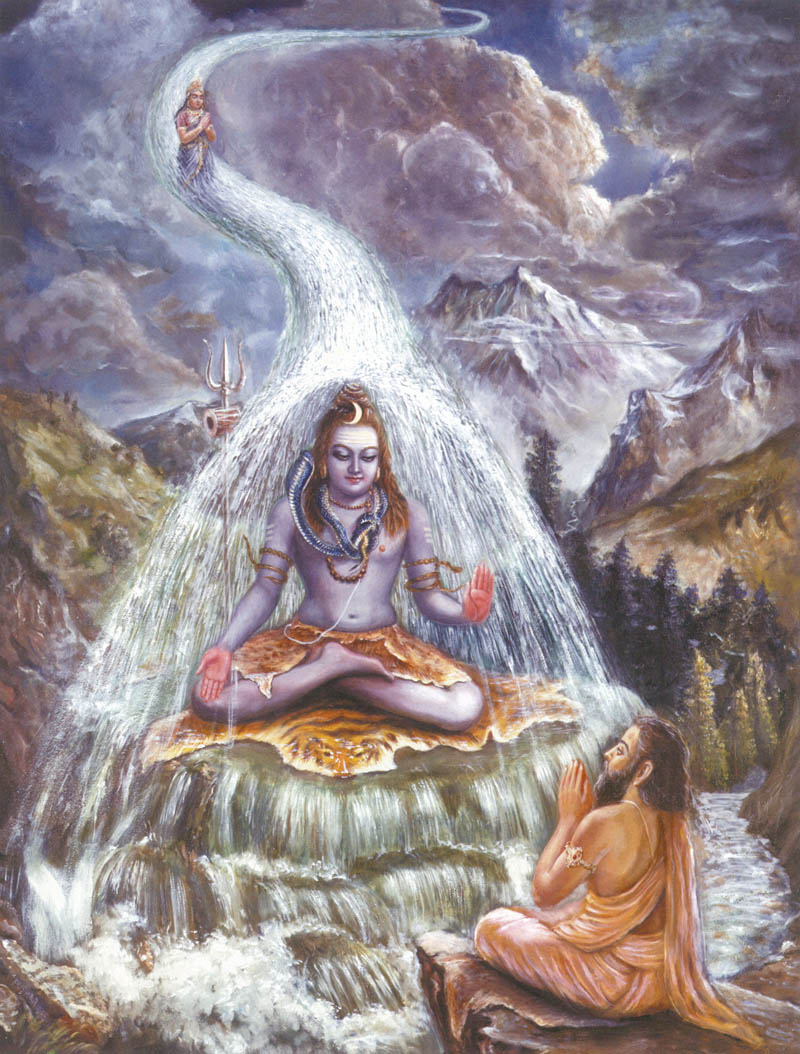 When he came to Jahnu Muni’s āśrama Bhagīratha paid his obeisances to the sage and continued, with the Surasari-Gaṅgā flowing closely behind him. The Gaṅgā’s dancing waves revealed her extreme delight to have entered Śrī Gaura-dhāma. She was not conscious of her body, and as she passed by Jahnu Muni’s hut, she swept away a part of it, as well as his water pot and some other belongings. The Gaṅgā’s rippling sound, sprinkles of her water and a cool breeze broke the sage’s meditation. Initially he was angry, but in a moment he realised that this stream of water was not ordinary. It had come from the Causal Ocean, and Lord Brahmā had used it to wash Śrī Vāmanadeva’s feet. That same water was now flowing as the very pure water of patita-pāvanī Bhagavatī-Gaṅgā, which is rarely attained by the demigods. With great faith Jahnu Muni bowed his head, promptly scooped all the Gaṅgā’s water into his hollowed palm and drank it. This left the Gaṅgā, who was flowing from above, unable to proceed. Bhagīratha was most perturbed, but somehow he pleased the sage, who scratched his thigh. With a rippling sound, the Gaṅgā emerged from it and encircled the entire area of Śrī Navadvīpa, flowing in such a way as to divide the land into nine parts. Since then, it has been called Navadvīpa, or “nine islands”. Because she had entered the sage’s stomach and manifested again from his thigh, Śrī Gaṅgā became known as Śrī Jahnu Muni’s dear daughter Jāhnavī, and this place became known as Jahnudvīpa.
When he came to Jahnu Muni’s āśrama Bhagīratha paid his obeisances to the sage and continued, with the Surasari-Gaṅgā flowing closely behind him. The Gaṅgā’s dancing waves revealed her extreme delight to have entered Śrī Gaura-dhāma. She was not conscious of her body, and as she passed by Jahnu Muni’s hut, she swept away a part of it, as well as his water pot and some other belongings. The Gaṅgā’s rippling sound, sprinkles of her water and a cool breeze broke the sage’s meditation. Initially he was angry, but in a moment he realised that this stream of water was not ordinary. It had come from the Causal Ocean, and Lord Brahmā had used it to wash Śrī Vāmanadeva’s feet. That same water was now flowing as the very pure water of patita-pāvanī Bhagavatī-Gaṅgā, which is rarely attained by the demigods. With great faith Jahnu Muni bowed his head, promptly scooped all the Gaṅgā’s water into his hollowed palm and drank it. This left the Gaṅgā, who was flowing from above, unable to proceed. Bhagīratha was most perturbed, but somehow he pleased the sage, who scratched his thigh. With a rippling sound, the Gaṅgā emerged from it and encircled the entire area of Śrī Navadvīpa, flowing in such a way as to divide the land into nine parts. Since then, it has been called Navadvīpa, or “nine islands”. Because she had entered the sage’s stomach and manifested again from his thigh, Śrī Gaṅgā became known as Śrī Jahnu Muni’s dear daughter Jāhnavī, and this place became known as Jahnudvīpa.
Jāhnavī-Gaṅgā
The Purāṇas give another narration about Śrī Gaṅgā. In Goloka, Gaṅgā is Kṛṣṇa’s beloved sakhī. Once in a 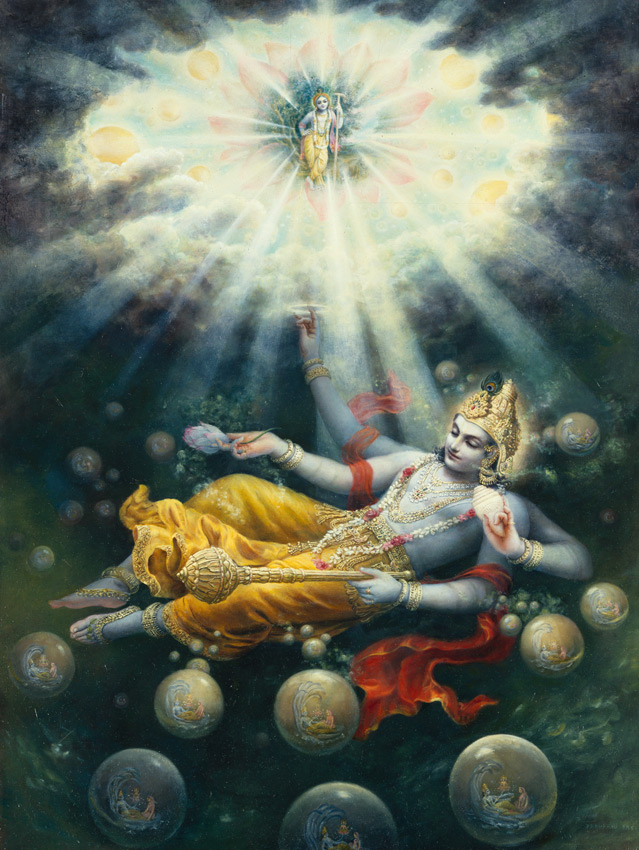 secluded part of Goloka she was deeply absorbed in charming ambrosial talks with Kṛṣṇa, when suddenly she noticed Śrīmatī Rādhikā and Her sakhīs approaching. Gaṅgā became embarrassed and in her embarrassment she turned into water. Smiling, Rādhikā asked Śrī Kṛṣṇa, “Where did that sakhī of Yours go?” Kṛṣṇa made the gestures of one trying to excuse himself and said, “Apart from You there is no other sakhī here.” Śrīmatī Rādhikā understood Kṛṣṇa’s words and accepted Gaṅgā as Her sakhī. The Gaṅgā, as water, is eternally situated in Goloka, as is the Yamunā. A portion of the Gaṅgā is manifest as the Causal Ocean, with which Lord Brahmā washed Śrī Vāmanadeva’s lotus feet.
secluded part of Goloka she was deeply absorbed in charming ambrosial talks with Kṛṣṇa, when suddenly she noticed Śrīmatī Rādhikā and Her sakhīs approaching. Gaṅgā became embarrassed and in her embarrassment she turned into water. Smiling, Rādhikā asked Śrī Kṛṣṇa, “Where did that sakhī of Yours go?” Kṛṣṇa made the gestures of one trying to excuse himself and said, “Apart from You there is no other sakhī here.” Śrīmatī Rādhikā understood Kṛṣṇa’s words and accepted Gaṅgā as Her sakhī. The Gaṅgā, as water, is eternally situated in Goloka, as is the Yamunā. A portion of the Gaṅgā is manifest as the Causal Ocean, with which Lord Brahmā washed Śrī Vāmanadeva’s lotus feet.
Once, in Emperor Akbara’s court in Agra a question arose as to which of the two rivers – the Gaṅgā or the Yamunā – was superior. A discussion ensued. Kings, feudal princes and royal scholars who resided on the banks of the Gaṅgā stated she was superior. And those living on the banks of Śrī Yamunā asserted that she was superior. The controversy could not be resolved. At that time, Śrī Jīva Gosvāmī was performing bhajana in Vṛndāvana, having accepted a vow to remain in a holy place of pilgrimage (kṣetra-sannyāsa). In his time, he was celebrated as the world’s most learned saintly personality. With much honour and faith, Akbara summoned Śrī Jīva Gosvāmī to Agra in the hope that he could resolve this issue, but Śrī Jīva Gosvāmī was not prepared to leave Vraja, even for one day. Upon the Emperor’s strong insistence Jīva Gosvāmī finally agreed to go on the condition that he could return to Vraja the same day. The Emperor made all travel arrangements, and Śrī Jīva Gosvāmī thus attended the royal court.
After hearing the arguments on both sides Jīva Gosvāmī gave his conclusion, “According to the scriptures, Śrī  Kṛṣṇa is the Supreme Lord. Śrī Vāmanadeva is a part of a part of Lord Śrī Kṛṣṇa Himself, and Śrī Gaṅgā is the water that washed His lotus feet. On the other hand, Śrī Yamunā, or Kālindī, is one of the queens of Śrī Kṛṣṇa. As His dearmost beloved she is nondifferent from Him. Now, you can decide who is superior. The benefit one gets from taking a bath in the Gaṅgā is attained simply by thinking of the Yamunā. By bathing in the Gaṅgā sins are removed, but by bathing in the Yamunā one will attain kṛṣṇa-prema and vraja-prema. Kṛṣṇa enjoys performing pastimes with His sakhās and sakhīs on Yamunā’s bank and in her waters.
Kṛṣṇa is the Supreme Lord. Śrī Vāmanadeva is a part of a part of Lord Śrī Kṛṣṇa Himself, and Śrī Gaṅgā is the water that washed His lotus feet. On the other hand, Śrī Yamunā, or Kālindī, is one of the queens of Śrī Kṛṣṇa. As His dearmost beloved she is nondifferent from Him. Now, you can decide who is superior. The benefit one gets from taking a bath in the Gaṅgā is attained simply by thinking of the Yamunā. By bathing in the Gaṅgā sins are removed, but by bathing in the Yamunā one will attain kṛṣṇa-prema and vraja-prema. Kṛṣṇa enjoys performing pastimes with His sakhās and sakhīs on Yamunā’s bank and in her waters.
“But a special consideration is to be made in this connection. Śrī Gaṅgā joins with Śrī Yamunā at Prayāga, and together they proceed to Śrī Navadvīpa-dhāma, the place of Mahāprabhu’s pastimes. The Gaṅgā flows on the eastern side and the Yamunā flows on the western side. Śrī Caitanya Mahāprabhu performs His various pastimes in the combination of these two waters. Such great fortune places the Bhagavatī-Bhāgīrathī Gaṅgā on an equal status to Śrī Yamunā. The Gaṅgā is capable of giving gaura-prema, which is non-different from kṛṣṇa-prema.”
All members of the assembly appreciated Śrī Jīva Gosvāmī’s conclusion, and Emperor Akbar also received the great fortune of having his darśana.

The following is an excerpt from Śrīla Bhaktivedānta Nārāyaṇa Mahārāja’s commentary on Śrī Manaḥ-śikṣā, 4th edition
Śrī Yamunāṣṭakam
Śrīla Rūpa Gosvāmī
bhrātur antakasya pattane ’bhipatti-hāriṇī
prekṣayāti-pāpino ’pi pāpa-sindhu-tāriṇī
nīra-mādhurībhir apy aśeṣa-citta-bandhinī
māṁ punātu sarvadāravinda-bandhu-nandinī (1)
May Yamunā-devī, the daughter of Sūryadeva, who delights the friend of the lotus (Sūrya), always purify me. She saves those who touch her from going to the realm of her brother Yamarāja, and merely seeing her enables wicked sinners to cross the ocean of sin. She binds the hearts of everyone by the uninterrupted sweetness of her waters.
hāri-vāri-dhārayābhimaṇḍitoru-khāṇḍavā
puṇḍarīka-maṇḍalodyad-aṇḍajāli-tāṇḍavā
snāna-kāma-pāmarogra-pāpa-sampad-andhinī
māṁ punātu sarvadāravinda-bandhu-nandinī (2)
Yamunā-devī adorns Indra’s immense Khāṇḍava forest with her enchanting current, and upon her blooming white lotuses, birds such as wagtails always dance with great jubilation. To say nothing of those who bathe in her waters, even vile sinners are absolved from dreadful sins simply by desiring to bathe in the Yamunā. May Yamunā-devī, the daughter of Sūryadeva, who delights the friend of the lotus, always purify me.
śīkarābhimṛṣṭa-jantu-durvipāka-mardinī
nanda-nandanāntaraṅga-bhakti-pūra-vardhinī
tīra-saṅgamābhilāṣi-maṅgalānubandhinī
māṁ punātu sarvadāravinda-bandhu-nandinī (3)
Yamunā-devī destroys the reactions to the atrocious sins committed by those who merely touch a drop of her water. She increases the flow of rāgānuga-bhakti for Nanda-nandana Śrī Kṛṣṇa within one’s heart and benedicts anyone who simply desires to reside on her banks. May Yamunā-devī, the daughter of the sun-god, who delights the friend of the lotus, always purify me.
dvīpa-cakravāla-juṣṭa-sapta-sindhu-bhedinī
śrī-mukunda-nirmitoru-divya-keli-vedinī
kānti-kandalībhir indranīla-vṛnda-nindinī
māṁ punātu sarvadāravinda-bandhu-nandinī (4)
Yamunā-devī is so inconceivably powerful that although she flows through the seven oceans which surround the seven giant islands of Bhū-maṇḍala, she never merges into them as ordinary rivers do. Being an intimate witness to Śrī Kṛṣṇa’s wonderful, transcendental pastimes, she causes those pastimes to arise in the hearts of those who take shelter of her. Her dark, shimmering beauty defeats that of even a precious blue sapphire. May the daughter of the sun god, Yamunādevī, who delights the friend of the lotus, always purify me.
māthureṇa maṇḍalena cāruṇābhimaṇḍitā
prema-naddha-vaiṣṇavādhva-vardhanāya paṇḍitā
ūrmi-dor-vilāsa-padmanābha-pāda-vandinī
māṁ punātu sarvadāravinda-bandhu-nandinī (5)
Ornamented by the supremely enchanting land of Mathurā-maṇḍala, Yamunā-devī is adept in propelling advancement upon the path of Vaiṣṇavism for those devotees who are bound by prema. In other words, she directly manifests rāgānuga-bhakti in the hearts of those devotees who bathe in her waters. With her waves, which are like playful arms, she worships Śrī Kṛṣṇa’s lotus feet. May the daughter of the sun god, Yamunā-devī, who delights the friend of the lotus, always purify me.
ramya-tīra-rambhamāṇa-go-kadamba-bhūṣitā
divya-gandha-bhāk-kadamba-puṣpa-rāji-rūṣitā
nanda-sūnu-bhakta-saṅgha-saṅgamābhinandinī
māṁ punātu sarvadāravinda-bandhu-nandinī (6)
Yamunā-devī is further beautified by the presence of the cows mooing in deep subdued tones on both sides of her supremely attractive banks. She is scented by the celestial fragrance emanating from the flowers of the kadamba trees that line her shores. She is always overjoyed by the gathering of the dear devotees of Śrī Nanda-nandana. May Yamunā-devī, the daughter of Sūryadeva, who delights the friend of the lotus, always purify me.
phulla-pakṣa-mallikākṣa-haṁsa-lakṣa-kūjitā
bhakti-viddha-deva-siddha-kinnarāli-pūjitā
tīra-gandhavāha-gandha-janma-bandha-randhinī
māṁ punātu sarvadāravinda-bandhu-nandinī (7)
Yamunā-devī reverberates with the captivating sound of hundreds of thousands of elated white swans who glide upon her waters. She is always worshipped by the devas, siddhas, kinnaras and human beings whose hearts are dedicated to the service of Śrī Hari. By the slightest touch of the breezes that gently blow upon her banks, the living entities’ bondage to repeated birth and death is cut to pieces. May the daughter of the sun god, Yamunā-devī, who delights the friend of the lotus, always purify me.
cid-vilāsa-vāri-pūra-bhūr-bhuvaḥ-svar-āpinī
kīrtitāpi durmadoru-pāpa-marma-tāpinī
ballavendra-nandanāṅgarāga-bhaṅga-gandhinī
māṁ punātu sarvadāravinda-bandhu-nandinī (8)
Yamunā-devī pervades the entire three worlds known as Bhū, Bhuva and Sva by the flow of her water, which carries in it the direct revelation of the uncommon transcendental pastimes of Śrī Śrī Rādhā-Kṛṣṇa Yugala. Thus she causes those pastimes to be broadcast throughout the three worlds. By singing her glories, the deeply-rooted core of insurmountable, abysmal sins are completely burnt to ashes. She has become supremely fragrant due to the sandalwood paste and kuṅkuma that anoints the body of Vrajarāja-kumāra Śrī Kṛṣṇa and that melts in her water as He enjoys His water-sports. May Yamunā-devī, who is the daughter of the sun god and who delights the friend of the lotus, always purify me.
tuṣṭa-buddhir aṣṭakena nirmalormi-ceṣṭitāṁ
tvām anena bhānu-putri! sarva-deva-veṣṭitām
yaḥ stavīti vardhayasva sarva-pāpa-mocane
bhakti-pūram asya devi! puṇḍarīka-locane (9)
O daughter of Sūryadeva, O divine goddess, Śrī Yamunā, I submit this prayer at your feet, that you may benedict those intelligent and contented persons who recite this composition in glorification of you who are surrounded by all the demigods and who are possessed of immaculate activities in the form of your transparent waves. May you expand the current of their bhakti for the lotus-eyed Śrī Kṛṣṇa, who liberates people from all sins including ignorance.
 Śrīmad Śaṅkarācārya has composed the following prayer in glorification of the Gaṅgā known as Śrī Gaṅgā-stotram (Śrī Gauḍīya Gīti-guccha, An Anthology of Gauḍīya Vaiṣṇava Songs – Abridged Edition, 7th Edition, February 2016)
Śrīmad Śaṅkarācārya has composed the following prayer in glorification of the Gaṅgā known as Śrī Gaṅgā-stotram (Śrī Gauḍīya Gīti-guccha, An Anthology of Gauḍīya Vaiṣṇava Songs – Abridged Edition, 7th Edition, February 2016)
Śrī Gaṅgā-stotram
Śrīmad Śaṅkarācārya
devi! sureśvari! bhagavati! gaṅge!
tri-bhutvana-tāriṇi! tarala-taraṅge
śaṅkara-mauli-nivāsini! vimale!
mama matir āstāṁ tava pada-kamale (1)
O brilliant goddess! O sovereign of all the demigods! O Bhagavati, dearly beloved of the Supreme Lord! O Gaṅgā, who brings liberation to the three worlds! Your waves are playful, and you reside on Lord Śaṅkara’s (Śiva’s) crown. O immaculate one! May my attention be fixed upon your lotus-like feet.
bhāgirathi! sukha-dāyini! māt-
stava jala-mahimā nigame-khyātaḥ
nāhaṁ jāne tava mahimānaṁ
trāhi kṛpāmayi! māmajñānam (2)
O Bhāgirathī, who answered the prayers of King Bhāgiratha! O Mother, who bestows bliss! The glory of your holy waters is described in the Vedas. I am entirely ignorant of your magnificence. O merciful one, please save this dullard!
hari-pādapadma-vihariṇi! gaṅge!
hima-vidhu-muktā-dhavala-taraṅge!
dūri-kuru mama duṣkṛiti-bhāraṁ
kuru kṛpayā bhava-sāgara-pāram (3)
O Gaṅgā, who frolics at Śrī Hari’s lotus feet! Your waves are as white as snow, as white as the moon, and as white as pearls. Please eradicate the burden of my sins. Mercifully carry me across the ocean of material existence.
tava jalam amalaṁ yena nipītaṁ
parama-padam khalu tena gṛhītam
mātar gaṅge! tvayi yo bhaktaḥ
kila taṁ draṣṭuṁ na yamaḥ śaktaḥ (4)
Anyone who drinks your pure water attains the highest destination. O Mother Gaṅgā, Yama, the god of death, cannot even look at that person who is devoted to you.
patitoddhāriṇi! jāhnavi! gaṅge!
khaṇḍita-giri-vara-maṇḍita-bhaṅge!
bhīṣma-jananī! khalu muni-vara-kanye!
patita-nivāriṇi! tri-bhuvana-dhanye! (5)
O saviour of the fallen! O Gaṅgā, daughter of the sage Jahnu! Your streams are adorned by the best of mountains. O mother of Bhīṣma! You are indeed the daughter of the best of sages. O saviour of the fallen! You are glorious throughout the three worlds.
kalpa-latām iva phala-dāṁ loke
praṇamati yas tvāṁ na patati śoke
pārāvāra-vihāriṇi! mātar gaṅge!
vibudha-vanitā-kṛta-taralāpāṅge! (6)
You fulfil one’s desires just like a wish-fulfilling creeper. He who offers respect to you never perishes in grief. O Mother Gaṅgā, who frisks between two banks! The wives of the demigods restlessly glance at you from the corners of their eyes.
tava kṛpayā cet srotaḥ-snātaḥ
punar api jaṭhare so ‘pi na jātaḥ
naraka-nivāriṇi! jāhnavi! gaṅge!
kaluṣa-vināśinī! mahimottuṅge! (7)
If by your mercy a person chances to bathe in your waters, he never takes birth from a mother’s womb again. O Gaṅgā, daughter of sage Jahnu, you save one from hell and eliminate one’s sinful reactions. You are always at the pinnacle of glory.
punar asad-aṅge! puṇya-taraṅge!
jaya jaya jāhnavi! karuṇāpāṅge!
indra-mukuṭa-mani-rājita-caraṇe!
śukha-de! śubha-de! sevaka-śaraṇe! (8
Your body consists of numerous rivers, and your waves are holy. Glory, glory to you, O Jāhnavi, whose whole body is comprised of compassion! Indra’s crown, studded with precious stones, always decorates your feet. O you who bestow happiness and goodness, you are the shelter of your servants.
rogaṁ śokaṁ tāpaṁ pāpaṁ
hara me bhagavati! kumati-kalāpam
tri-bhuvana-sāre! vasudhā-hāre!
tvam asi gatir mama khalu saṁsāre (9)
O Bhagavati, please take away my disease, grief, suffering, sins, and delusion. Your presence is essential in the three worlds. You are the precious necklace embellishing the earth. You are doubtlessly my only shelter in the repeated cycle of birth and death.
alakānande! paramānande!
kuru mayi karuṇāṁ kātara-vandye!
tava taṭa-nikaṭe yasya nivāsaḥ
khalu vaikuṇṭhe tasya nivāsaḥ (10)
O Alakānanda who descends from the Himālayas! O you who personify supreme bliss! Please bestow mercy upon me, for you are worshipped by all the wretched. Whoever lives on your banks indisputably resides in the transcendental abode of Vaikuṇṭha.
varam iha nīre kamaṭho mīnaḥ
kiṁ vā tīre śaraṭaḥ kṣīṇaḥ
atha vā gavyūti-śvapaco dīnas
tava na hi dūre nṛ-patiḥ-kulīnaḥ (11)
It is better to be a turtle or fish in your waters, a tiny lizard on your banks, or even a wretched dog-eater living within two krośas (four square miles) from you, than to be a king of noble lineage who lives far from you.
bho bhuvaneśvari! puṇye! dhanye!
devi! dravamayi! munivara-kanye!
gaṅgā-stavam imam amalaṁ nityaṁ
paṭhati naro yaḥ sa jayati satyam (12)
O Lady of the universe! O blessed one! O glorious one! O goddess, whose form is liquid! O daughter of the best of sages! That person who always recites this impeccable prayer in praise of Gaṅgā-devī truly gains victory.
yeṣāṁ hṛdaye gaṅgā-bhaktis
teṣāṁ bhavati sadā sukha-muktiḥ
madhura-manohara-pajjhaṭikābhih
paramānanda-kalita-lalitābhiḥ (13)
gaṅgā-stotram idaṁ bhava-sāraṁ
vāñchita-phala-daṁ vigalita-bhāram
śaṅkara-sevaka-śaṅkara-racitaṁ
paṭhati ca vinayīdam iti samāptam (14)
Bliss and liberation are the property of those whose heart is the abode of devotion to Gaṅgā. The amazing verses of this Gaṅgāstotra, which are saturated with supreme bliss, are written by Śaṅkarācārya, the servant of Lord Śaṅkara, in the enchanting meter known as pajjhatika.
This stotra bestows the desired result and liberates one from all types of burden. Thus ends this prayer, which is chanted regularly by gentle persons.
Source: Purebhakti.com
Image(s) made possible by Pixabay.com, Krishnapath.org and/or Bhaktiart.net
Unless indicated differently, all verse translations and quotes are from the books by Śrīla Prabhupāda (Vedabase.com)